‘Joker: Folie à Deux’ star Harry Lawtey on becoming Harvey Dent
Stepping up to play a comic-book icon in the big-budget sequel Joker: Folie à Deux could prove a life-changing moment for Industry star Harry Lawtey. But he’s trying not to think about it…
By Paul Kirkley

Five years ago, Harry Lawtey was sitting in a Cardiff cinema, the sole patron in a 10am screening of Todd Phillips’ twisted psychological thriller, Joker. “That’s kind of my preference: an empty theatre, and always a morning screening,” says the actor, who — only a year out of drama school — had just begun shooting a new BBC/HBO drama about young investment bankers at the city’s Wolf Studios. “And it completely floored me, that film, as a piece of work. The way it was just so unapologetically dark, and challenged people’s expectations of what you are able to do with those [comic- book] stories.”
Fast-forward four years, and Lawtey — back in the Welsh capital to film the third series of what the world now knows as Industry — returned to the same deserted cinema, on another morning off, to watch his friend and co-star Marisa Abela appear in Greta Gerwig’s Barbie. By which time, he’d already wrapped filming on a Hollywood blockbuster of his own — playing Gotham City’s legendary district attorney Harvey Dent in the highly anticipated sequel, Joker: Folie à Deux.
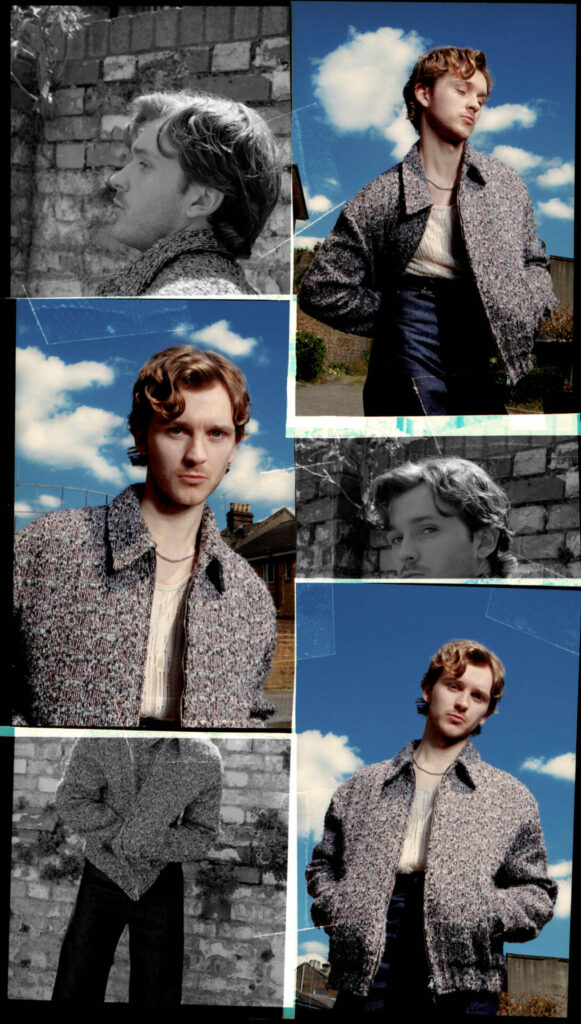
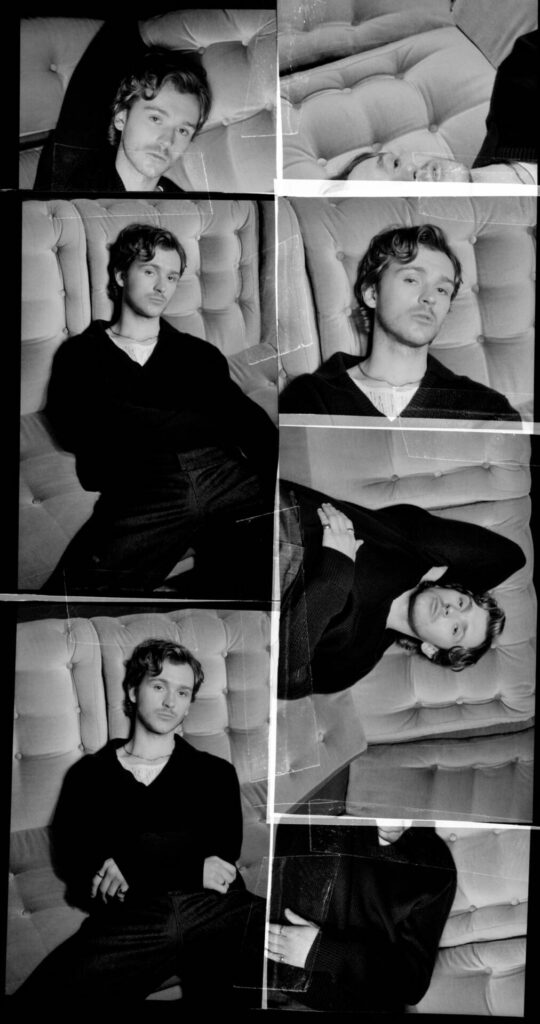
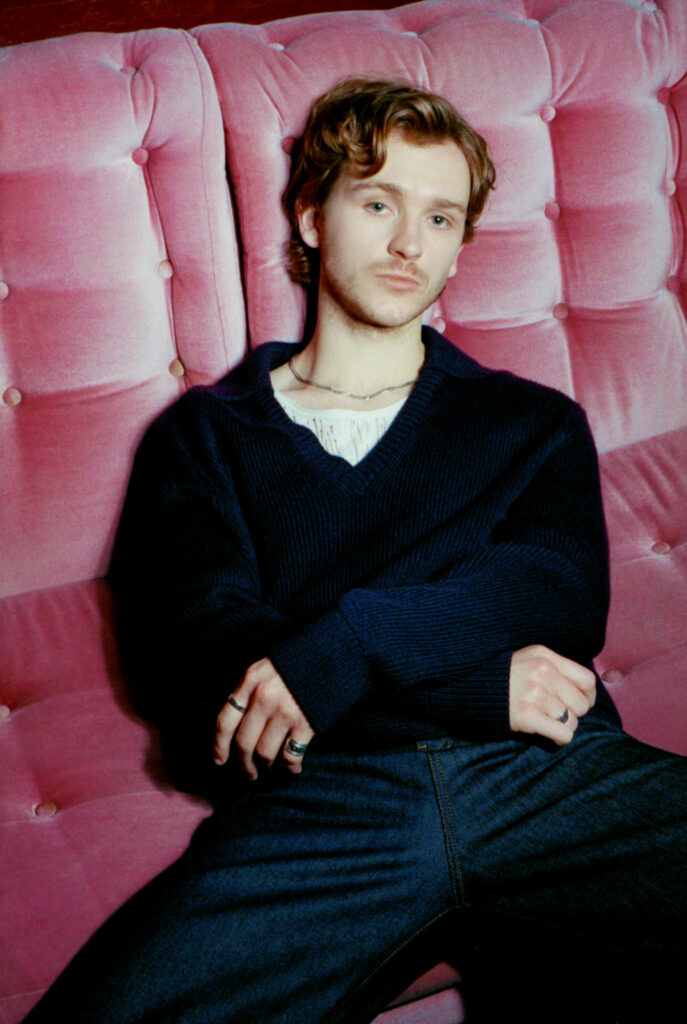
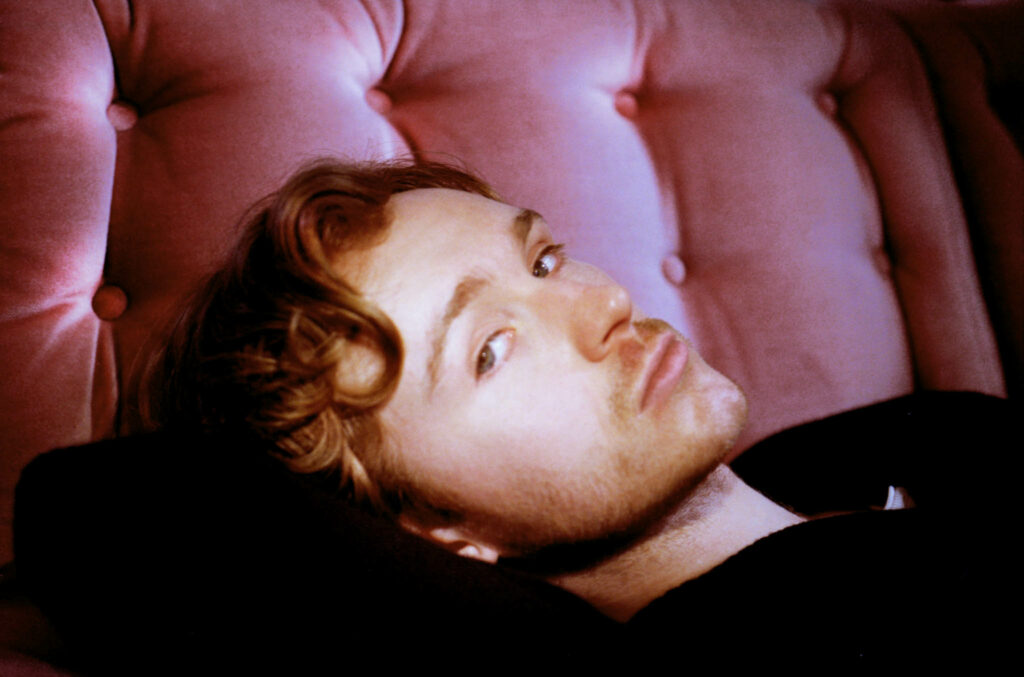
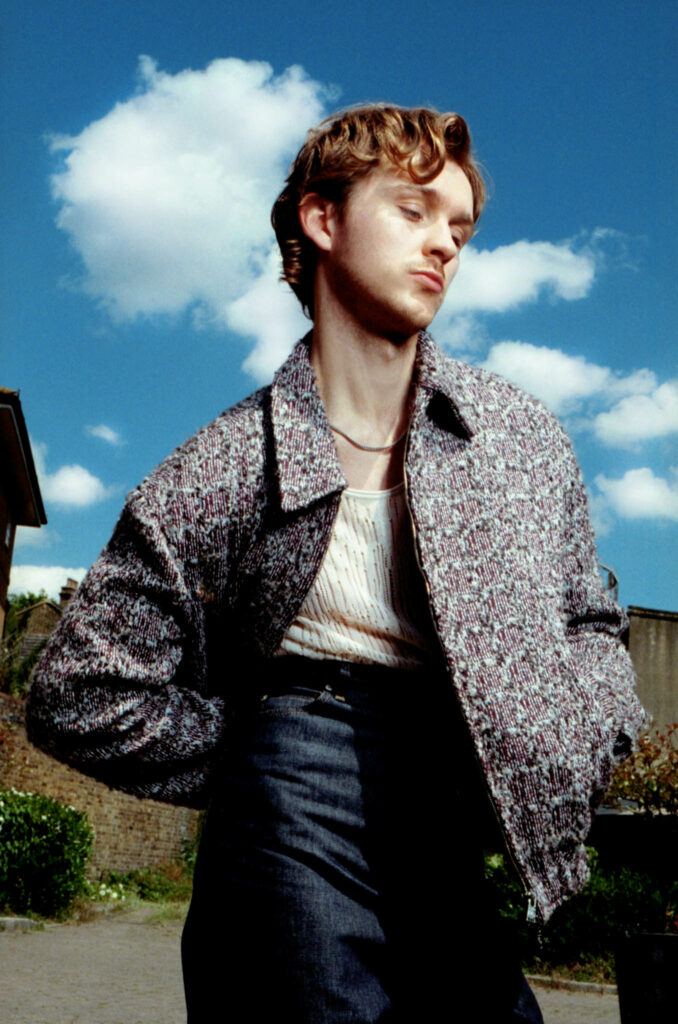
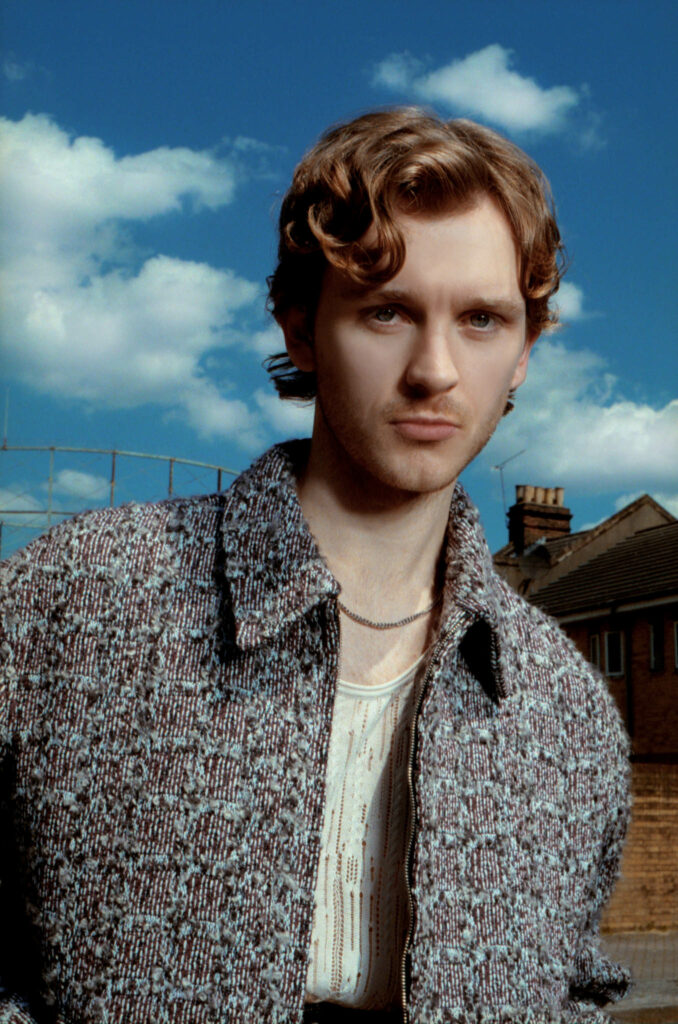
“I didn’t go back there as any kind of full-circle moment,” stresses Lawtey, when I meet the 27-year-old at a hotel close to his home in Shepherd’s Bush. “But I did definitely have a flashback to that moment a few years earlier in the same theatre. It’s a bit of a cliché, I know, but if you’d said to that kid back then, ‘This is what’s going to happen…’ he wouldn’t have been able to fathom it.”
Landing the part was so simple (he made a self-tape, Phillips liked it, and hired him pretty much on the spot), he feels “almost embarrassed about it”. But arriving in LA for the shoot, he knew he had to meet the moment. “The expectation — of the profile of the film, and the company I was keeping on set — was irrefutable, really, and hard to ignore,” he says. “But then I feel that in anything I do. Which can often be a burden to my enjoyment of the work.”
Added to that, Dent’s role as the — spoiler alert — prosecutor charged with convicting Joaquin Phoenix’s Arthur Fleck / Joker meant rising to the challenge of some fairly meaty courtroom scenes. “They are a big pressure, because there’s an audience,” reflects Lawtey. “There’s an undeniable kind of theatre to it — you’ve got to hit the back wall and fill the room. But I really enjoyed that.”
Phoenix has a reputation for intensity (Variety called him “a one-man cult of depressive method-acting”), but Lawtey says nothing could be further from the truth. “Honestly, it was a revelation to be around him. I don’t think it’s any hyperbole to say he’s a maestro. He’s on a sort of genius spectrum, in my eyes. And yet he’s the most popular guy on set. He showed me that it’s perfectly possible to treat everyone with respect and generosity and dignity, while also doing extraordinary work.
“Plus, he’s fun to be around. A lot of his endeavour is trying to make Todd laugh. Genuinely, he makes so many funny choices in the role. Though I wouldn’t be surprised if some of that falls by the wayside in the cut.”
Similarly, Lady Gaga — who, as music therapist Harley Quinn, strikes up a bad romance with the incarcerated Joker in Arkham Asylum — is an exotic creature who appears to exist outside our mortal realm, but Lawtey found her disarmingly approachable. “She is a cultural icon,” he says. “So, to be in that orbit was sort of extraordinary — and all the more fascinating because she’s really down to earth. There were no airs and graces: she just came up and introduced herself using her first name.”

Lady? “No, her actual name,” he laughs (it’s Stefani). “But there’s a myriad of names people call her, and it all lends itself to this holistic creative force that she is. I saw her sing from a couple of metres away,” he adds. “I felt very privileged to have that front-row seat. It’s something I won’t forget, for sure.”
Because, oh yes, did we mention that Folie à Deux is also a musical? “It’s a bold move, and I think Todd is aware it’s absolutely a risk,” says Lawtey (who doesn’t get to belt out a showstopper himself, sadly). “But they achieved such an extraordinary thing with the first film, both commercially and creatively, that there’s no point making another one unless you’re similarly bold. You’ve got to meet that expectation head on and take a big swing.”
With its depiction of a disaffected populace putting its faith in questionable figures — in this case, the unlikely folk hero of a murderous clown — the sequel’s arrival in 2024 feels almost uncomfortably timely.
“It’s about the dialogue between the individual and the state, and how we define corruption,” nods Lawtey. “What is good and evil? And when someone has lived in really difficult circumstances, where does evil begin? I don’t think it’s reaching at all to say that’s a product of the current political and cultural landscape. We’ve been through a great deal, and I would certainly argue we haven’t been protected, guided or inspired by our leaders as we would hope. It’s worryingly blatant that we’ve been let down from every angle.”

Lawtey’s most recent movie role prior to Folie à Deux was in Netflix period thriller The Pale Blue Eye, starring Christian Bale. “If you’d told my 14-year-old self I’d go from working with Batman to the Joker…” he says with a laugh, about a film that saw him playing the son of Gillian Anderson and Toby Jones. “You sit at a table with a cast like that, and of course the imposter syndrome kicks in in a big old way. But what a treat. It’s like a second schooling, really.”
He was reunited with Jones for upcoming feature Mr Burton, which finds him stepping up to leading man as a young Richard Burton (when we meet, a week after the end of shooting, his hair is still dyed Burton black).
Before that, though, there’s Industry season three, which will see Lawtey’s troubled City banker Rob Spearing paired with a slippery aristocrat client played by Game of Thrones’ Kit Harington. Though the on-screen relationship is strained, behind the scenes we’re hearing the word bromance bandied about a lot… “And I will not dispel those rumours,” grins Lawtey. “What you’ve heard is true. Yeah, he’s a great. A brilliant guy.”
There’s even a wrestling scene between the two of them. “It’s slightly more comical than what you have in mind,” says Lawtey. “It’s certainly not the sort of combat scene Kit Harington is used to.”
From its Lena Dunham-directed pilot episode, Industry proved to be a hit out of the blocks, its dizzyingly impenetrable trading floor talk of “tail-risk hedges” and “multi-asset plays” interspersed with generous lashings of sex —including, for Lawtey, a memorable scene that saw him projectile ejaculate onto a bathroom mirror. “I’d be lying if I said those scenes weren’t challenges,” he admits. “But you’ve got to lean on the belief you’re making them with integrity and with purpose, and I think that’s true of Industry.”

Watching the first series with his parents during lockdown was another matter, though. “That was an experience,” he smiles. “There were a few artfully timed trips to the kitchen to get a biscuit…”
Our first impression of Rob, in series one, is that he’s a ruthlessly ambitious corporate shark — but there’s more to him than meets the eye. “He’s certainly evolved,” says Lawtey. “He’s been humbled a huge amount, and revealed to be actually quite a kind, sensitive young man. I feel very connected to him.”
The character’s defining characteristic, believes Lawtey, is his insecurity about his working-class background in a world of moneyed privilege.
The actor’s own class is “hard to define”, he says. He has a “northern, working-class sensibility” inherited from his parents, childhood sweethearts from the small town of Barton-upon-Humber, near Hull. “I always think of that as home, in the sense that my entire extended family, from both sides, live there, and I’ve spent every Christmas of my entire life there. But I’ve never actually lived there.”
Instead, he grew up on military bases in Oxfordshire and then Cyprus, where his father was stationed as an aircraft engineer. As kids, he and his older brother George — now a first-team coach at Swansea City — were obsessed with football. But a touring production of Oliver Twist in a Cypriot amphitheatre performed by students from the Sylvia Young Theatre School turned Lawtey on to the idea of acting and, within a matter of weeks, he’d applied, auditioned and been offered a place himself — leaving his family in the Mediterranean to live as a boarding student in London, aged just 13.

He admits to being scared by his new adventure. “But kind of driven as well,” he says. “I was a pretty sensitive kid, but for some reason I knew in my heart and head it was the right decision, that was going to change my life. And everything that’s happened since stems back to that school.”
As for what happens next, Lawtey isn’t anticipating an imminent move to Hollywood and declines to comment on whether we’ll see him become Harvey Dent’s acid-scarred alter ego Two Face in Folie à Deux or any future franchise extensions. “America is a fascinating, wonderful country, and it’s been a joy to go out there a couple of times,” he says. “But it feels so detached from my life in Shepherd’s Bush.” (His only plan for today, he adds, is going to a pub quiz this evening.)
Certainly, it would be a tragedy if this charming, self-effacing young actor — who shows not a trace of arrogance or vanity — were to go too Hollywood on us. But if anything, says Lawtey, he’s becoming less sure of himself over time. “On Industry, Lena Denham really set the tone from the outset with her belief in us. I didn’t realise how much pressure was on us, I suppose, so we were just having a good time. And I’ve never felt that kind of freedom since. I’ve gradually become more neurotic as I’ve gone on,” he smiles. “I don’t know what that says about me, or the industry.”

He’s also spoken in the past about dealing with body issues (and this, lest we forget, from someone who’s been cast as Richard Burton, aka the most beautiful man in the world). “It’s an exhibitionist’s job — it’s inherently visible and public and extroverted and… I don’t feel like that all the time,” he says. “I’m social, but shy in my own way. And I suppose acting is an outlet for that. It unlocks the performer in you. Don’t get me wrong, I’m very fortunate —there are plenty of more difficult things I could be doing with my life than being an actor. It’s in large part a flimsy and ridiculous job. But sometimes, for me, to be seen by people is difficult.”
He knows, of course, that he’s about to be seen by more people than ever and is “trying not to think about” the potentially game-changing impact of joining the DC Universe.
“I don’t think that’s helpful,” he says. “I’m not a fool; I understand it’s an opportunity that will have more eyes on it, and more expectation, than anything I’ve done before. But ultimately my variables don’t change. It’s about trying to do your best, trying to care about the right things. It’s the same rules that apply to life, really. You’ve just got to take every day as it comes.”
Joker: Folie à Deux is in cinemas on 4 October
Taken from the October/November issue of Rolling Stone UK – you can buy it here now.
